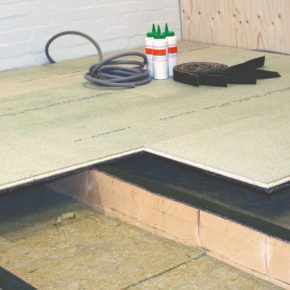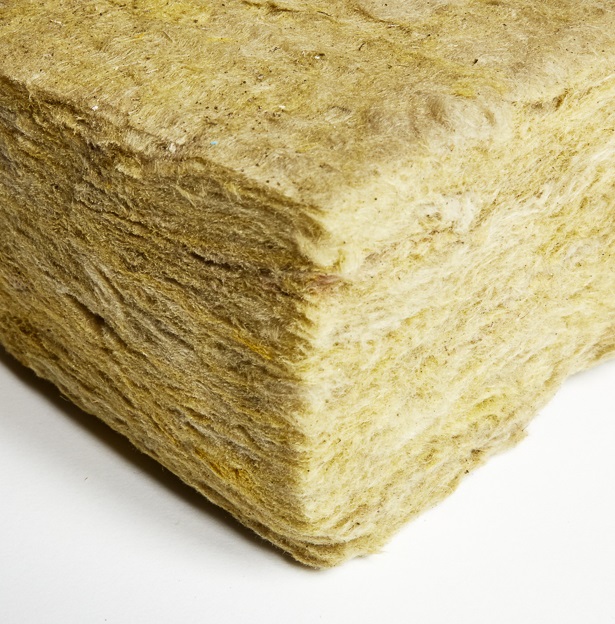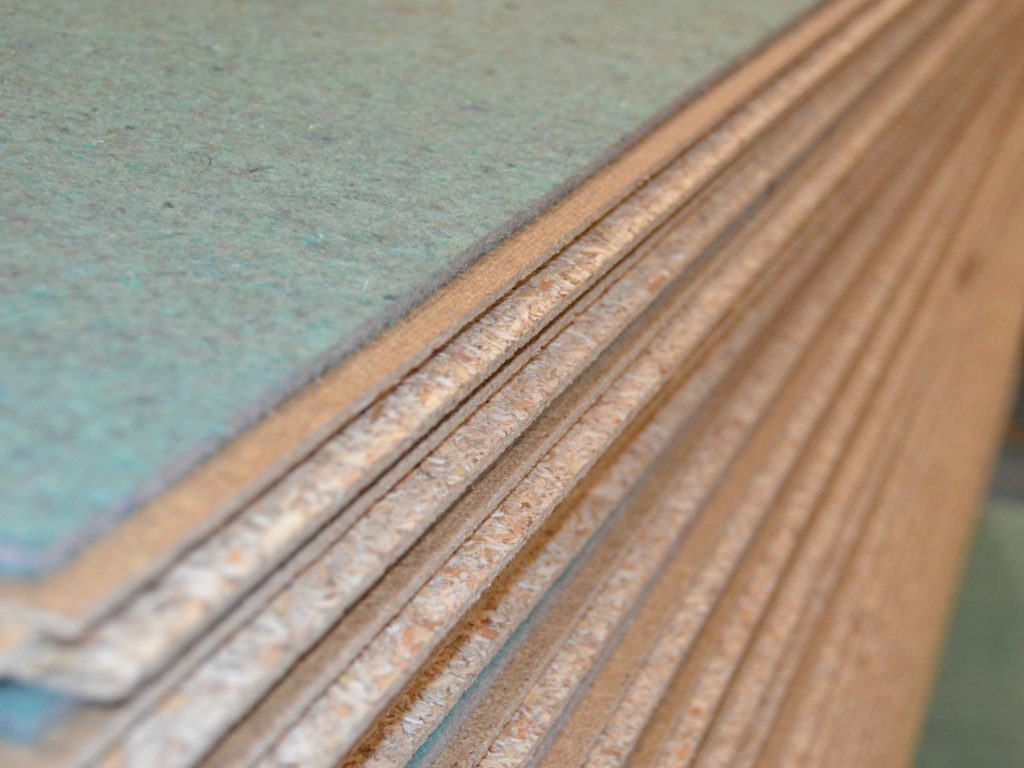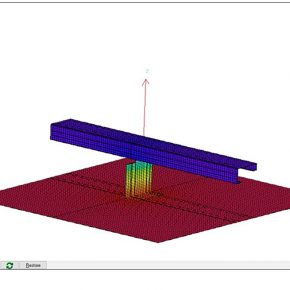
Hush Acoustics: How to soundproof a floor
Modern life is full of noise which can be difficult to escape from whether we are outside or in the comfort of our own homes. The high sound levels from traffic in urban areas, televisions, music and people talking loudly next door, and even within a property, is something that most homes were never designed to cope with – even those built today!
So, if you are experiencing unwanted noise intrusion inside your home, you are by no means alone. The good news is there are effective steps you can take to soundproof your property, in particular to soundproof floors.
But before you begin thinking about the products you will need for soundproofing a floor, there are several important questions to consider. Hush Acoustics have more…
What type of noise have you been affected by?
What’s your situation? Are you living in an apartment or flat and being affected by noise from neighbouring properties above or below? Or are you living in a self-contained property, such as a detached house, where you want to reduce the noise from other rooms, such as a games room or cinema room or to make a bedroom quieter for sleeping?
If you live in a connected property like an apartment, clearly you will only be able to treat the floors that you have access to. So, if your noise problem is coming from a flat below, then you can treat your floor easily. If it is from above, obviously you won’t be able to soundproof the floor in someone else’s property, but you could be able to take action by soundproof your ceiling – read more on this topic here.
How loud is the noise and what type of noise is causing the problem?
There are two main types of sound transmission that we need to consider when soundproofing – airborne sound and impact sound. The different types of sound insulation products available will target either of these, with some products also addressing both.
Sound insulation designed to tackle airborne sound transmission will add mass to make it more difficult for soundwaves to get through the dense material. Products like the Hush-Slab 100 sound absorber panels are one such product, made from mineral wool fibres in a dense but flexible slab which is very effective at disrupting sound transmission paths.

For impact sounds, the insulation needed will generally be to add a resilient layer. This is designed to provide separation between materials, such as between a timber joist and a floorboard, to break the sound transmission paths. There are numerous products of this type available, such as rubber based membranes and joist strips, so there is a solution for almost all types of floor construction.
The loudness of the noise problem will also determine how you approach soundproofing. More severe noise such as loud music will need a different approach to, say, a fairly low level television.
How is the floor constructed?
The construction of the floors in our homes generally falls into two categories – timber construction using joists and boards or concrete with or without a screed.
The two different types of floor construction require very different soundproofing methods. For example, timber floors will generally feature voids between the joists which can be infilled using sound absorber slabs to address airborne noise, whereas concrete floors will not. They will, however, have a greater sold depth which may mean they only need to be treated for impact noise using a rubber membrane.
Other key issues
Sound will always try to find a transmission path, whether that is through solid materials, air or around soundproofing measures. That is why any attempt to soundproof a floor must address what is known as ‘flanking’, where sound waves find gaps in the insulation and undermine its performance. This is achieved using different types of seals for the perimeters of floors, such as Hush-Seal 20.
Cost and the loss of room space are other important factors that you should think about. Today’s advanced soundproofing products from Hush Acoustics are extremely effective when they are used in the correct ways, but if your problem is severe, achieving the highest performance may be costly. A lower specification solution will be less costly, but there will be a trade-off in that it will not provide the very best level of soundproofing – it is a cost versus performance dilemma.
Adding insulation to a floor is likely to add depth too, and this will have an impact on the rest of the room. The floor to ceiling height will be reduced, perhaps only slightly, and once the soundproofing is completed, redecoration and new floorcoverings are likely to be required. All of which will need budgeting for.
Products for soundproofing timber floors
One of the most common ways to soundproof a floor constructed using wooden floorboards and joists is to add a floating floor or replace the floorboards with acoustic floor panels. Both can be achieved using products such as Hush-Panel 28. This is manufactured using a high quality, moisture-resistant chipboard bonded to a resilient felt layer – Hush-Felt – adding density and separation in one. Once laid, the panels are sealed around the perimeter using one of the various seals available from Hush.

As we have mentioned already, the floating floor can be supplemented with joist strips to separate the floorboards from the joists – adding another resilient layer – and Hush-Slab 100 sound absorbers used to infill between the joists.
An acoustic underlay can also be used under your floorcovering, such as Hush FFR Resilient Underlay, to reduce impact sound transmission.
Soundproofing for concrete and screed floors
If you have a concrete floor, impact noise such as footsteps can be treated using rubber membranes. These will generally be required to provide separation between the floor surface and the structure.
Hush Acoustics offers a range of rubber-based products which we cover in more detail in this article here. Applied in the right way, these soundproofing products can make a significant difference.
Get expert advice from the soundproofing experts
It is extremely important to get the specification and design right when deciding which types of soundproofing products to use to achieve the results you seek. With the range of solutions available from Hush Acoustics, we have the products and systems to help you achieve the improvements you are seeking.
Hush Acoustics have been manufacturing and supplying acoustic insulation products for more than 30 years which means our sound reduction specialists have a wealth of expertise to offer.
If you require any assistance to create an acoustically insulated floor, ceiling or wall, visit www.hushacoustics.co.uk or call 0114 551 8684.
Hush Acoustics Ltd
Unit 2, Tinsley Industrial Estate
Shepcote Way
Sheffield
South Yorkshire
S9 1TH
Tel: 0114 551 8685
Fax: 0151 944 1146
Visit Supplier's page
Latest news

26th July 2024
Enfield Speciality Doors completes world-class project for Atlas Copco HQ
A rundown office and warehouse building completely transformed into a modern headquarters for Atlas Copco has been fitted with more than 120 internal fire doors from Enfield Speciality Doors.
Posted in Access Control & Door Entry Systems, Articles, Building Industry News, Building Products & Structures, Building Systems, Case Studies, Doors, Interior Design & Construction, Interiors, Posts, Restoration & Refurbishment, Retrofit & Renovation, Security and Fire Protection, Sustainability & Energy Efficiency, Timber Buildings and Timber Products, Wooden products
26th July 2024
Abloy UK launches new white paper
Abloy UK, a leading provider of security and access control solutions, has launched a new white paper.
Posted in Access Control & Door Entry Systems, Architectural Ironmongery, Articles, Building Industry News, Building Products & Structures, Building Services, Doors, Facility Management & Building Services, Health & Safety, Information Technology, Innovations & New Products, Publications, Research & Materials Testing, Security and Fire Protection
26th July 2024
MCRMA Member Profile: David Roy, Director of Roofconsult
David Roy of MCRMA member company Roofconsult has more than 50 years’ experience to draw upon working in the building envelope sector and a unique perspective on how it has changed in that time.
Posted in Articles, BIM, Infrastructure & CAD Software, Building Associations & Institutes, Building Industry News, Building Products & Structures, Building Services, Building Systems, Cladding, Information Technology, Restoration & Refurbishment, Retrofit & Renovation, Roofs, Walls
26th July 2024
Strand: Enhancing Door Functionality and Safety
Craig Fox, Sales Director for Strand Hardware, outlines how door industry professionals might apply door limiting stays…
Posted in Architectural Ironmongery, Articles, Building Industry News, Building Products & Structures, Building Services, Doors, Facility Management & Building Services, Health & Safety, Restoration & Refurbishment, Retrofit & Renovation
 Sign up:
Sign up: